Australian Politics: Culture, Democracy, and Citizen Engagement
VerifiedAdded on 2021/02/20
|6
|1581
|101
Essay
AI Summary
This essay delves into the intricacies of Australian political culture, examining the interplay between its democratic foundations and the challenges posed by apathy and cynicism. It begins by outlining the structure of the Australian government, highlighting the roles of major political parties like the Australian Labour Party, the Liberal Party of Australia, and the National Party of Australia, and emphasizing the country's strong economic and regulatory systems. The essay then addresses the central question of whether a tendency towards apathy and cynicism threatens the democratic process, arguing that such attitudes pose a significant risk by potentially leading to government decisions driven by self-interest rather than the public good. The analysis draws on survey data and expert opinions to demonstrate a decline in public trust and satisfaction with the government, suggesting that these trends are a direct consequence of political apathy and cynicism. The essay also includes an annotated bibliography with articles and books that provide further insights into the Australian political landscape. The provided references and external sources support the arguments presented, offering a comprehensive overview of the topic and the challenges facing Australian democracy.
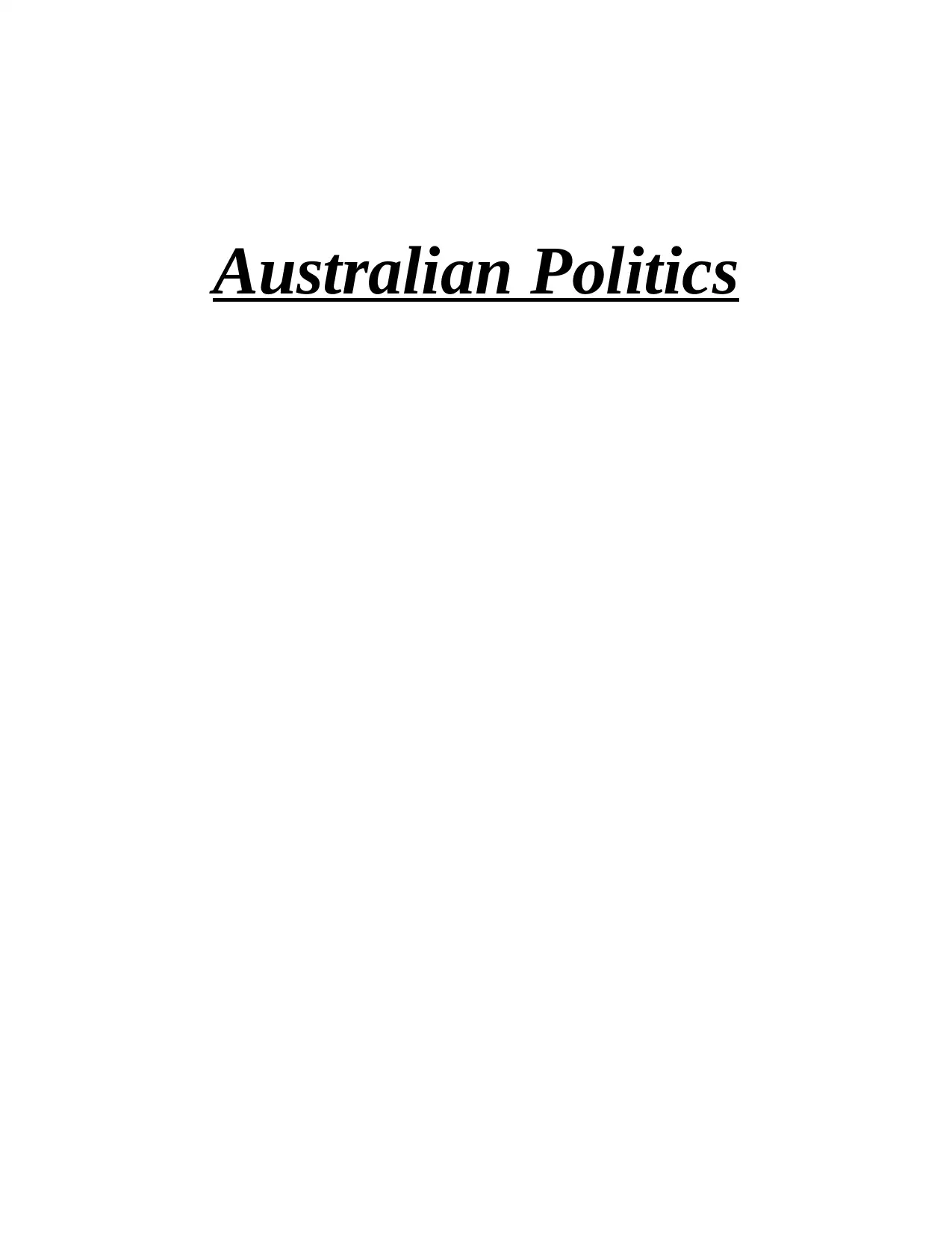
Australian Politics
Paraphrase This Document
Need a fresh take? Get an instant paraphrase of this document with our AI Paraphraser

Table of Contents
How would you describe Australia's political culture? Is the tendency towards apathy and
cynicism a sign that our democracy is healthy, or does it pose a threat to the democratic process?
..........................................................................................................................................................3
REFERENCES................................................................................................................................5
How would you describe Australia's political culture? Is the tendency towards apathy and
cynicism a sign that our democracy is healthy, or does it pose a threat to the democratic process?
..........................................................................................................................................................3
REFERENCES................................................................................................................................5
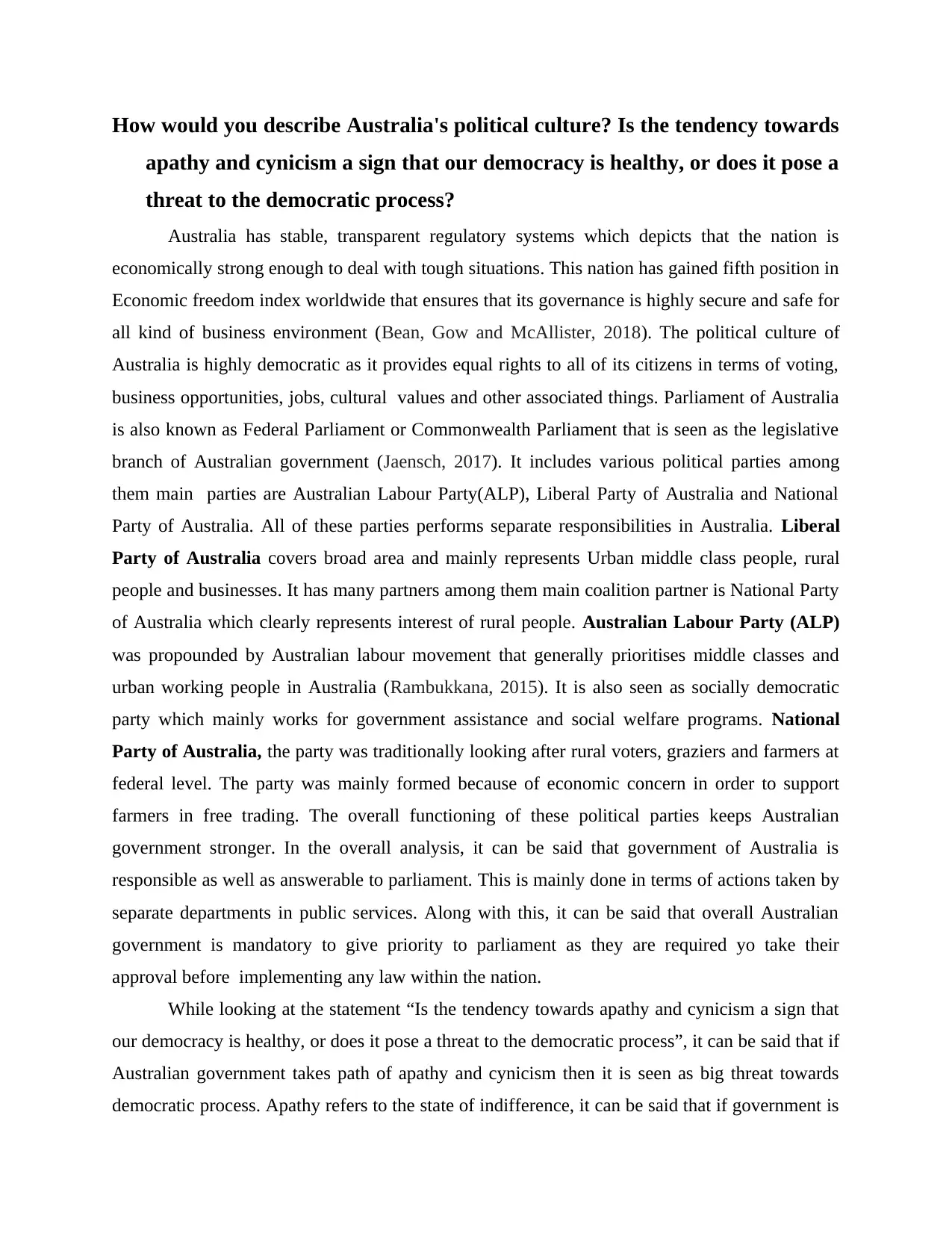
How would you describe Australia's political culture? Is the tendency towards
apathy and cynicism a sign that our democracy is healthy, or does it pose a
threat to the democratic process?
Australia has stable, transparent regulatory systems which depicts that the nation is
economically strong enough to deal with tough situations. This nation has gained fifth position in
Economic freedom index worldwide that ensures that its governance is highly secure and safe for
all kind of business environment (Bean, Gow and McAllister, 2018). The political culture of
Australia is highly democratic as it provides equal rights to all of its citizens in terms of voting,
business opportunities, jobs, cultural values and other associated things. Parliament of Australia
is also known as Federal Parliament or Commonwealth Parliament that is seen as the legislative
branch of Australian government (Jaensch, 2017). It includes various political parties among
them main parties are Australian Labour Party(ALP), Liberal Party of Australia and National
Party of Australia. All of these parties performs separate responsibilities in Australia. Liberal
Party of Australia covers broad area and mainly represents Urban middle class people, rural
people and businesses. It has many partners among them main coalition partner is National Party
of Australia which clearly represents interest of rural people. Australian Labour Party (ALP)
was propounded by Australian labour movement that generally prioritises middle classes and
urban working people in Australia (Rambukkana, 2015). It is also seen as socially democratic
party which mainly works for government assistance and social welfare programs. National
Party of Australia, the party was traditionally looking after rural voters, graziers and farmers at
federal level. The party was mainly formed because of economic concern in order to support
farmers in free trading. The overall functioning of these political parties keeps Australian
government stronger. In the overall analysis, it can be said that government of Australia is
responsible as well as answerable to parliament. This is mainly done in terms of actions taken by
separate departments in public services. Along with this, it can be said that overall Australian
government is mandatory to give priority to parliament as they are required yo take their
approval before implementing any law within the nation.
While looking at the statement “Is the tendency towards apathy and cynicism a sign that
our democracy is healthy, or does it pose a threat to the democratic process”, it can be said that if
Australian government takes path of apathy and cynicism then it is seen as big threat towards
democratic process. Apathy refers to the state of indifference, it can be said that if government is
apathy and cynicism a sign that our democracy is healthy, or does it pose a
threat to the democratic process?
Australia has stable, transparent regulatory systems which depicts that the nation is
economically strong enough to deal with tough situations. This nation has gained fifth position in
Economic freedom index worldwide that ensures that its governance is highly secure and safe for
all kind of business environment (Bean, Gow and McAllister, 2018). The political culture of
Australia is highly democratic as it provides equal rights to all of its citizens in terms of voting,
business opportunities, jobs, cultural values and other associated things. Parliament of Australia
is also known as Federal Parliament or Commonwealth Parliament that is seen as the legislative
branch of Australian government (Jaensch, 2017). It includes various political parties among
them main parties are Australian Labour Party(ALP), Liberal Party of Australia and National
Party of Australia. All of these parties performs separate responsibilities in Australia. Liberal
Party of Australia covers broad area and mainly represents Urban middle class people, rural
people and businesses. It has many partners among them main coalition partner is National Party
of Australia which clearly represents interest of rural people. Australian Labour Party (ALP)
was propounded by Australian labour movement that generally prioritises middle classes and
urban working people in Australia (Rambukkana, 2015). It is also seen as socially democratic
party which mainly works for government assistance and social welfare programs. National
Party of Australia, the party was traditionally looking after rural voters, graziers and farmers at
federal level. The party was mainly formed because of economic concern in order to support
farmers in free trading. The overall functioning of these political parties keeps Australian
government stronger. In the overall analysis, it can be said that government of Australia is
responsible as well as answerable to parliament. This is mainly done in terms of actions taken by
separate departments in public services. Along with this, it can be said that overall Australian
government is mandatory to give priority to parliament as they are required yo take their
approval before implementing any law within the nation.
While looking at the statement “Is the tendency towards apathy and cynicism a sign that
our democracy is healthy, or does it pose a threat to the democratic process”, it can be said that if
Australian government takes path of apathy and cynicism then it is seen as big threat towards
democratic process. Apathy refers to the state of indifference, it can be said that if government is
⊘ This is a preview!⊘
Do you want full access?
Subscribe today to unlock all pages.

Trusted by 1+ million students worldwide
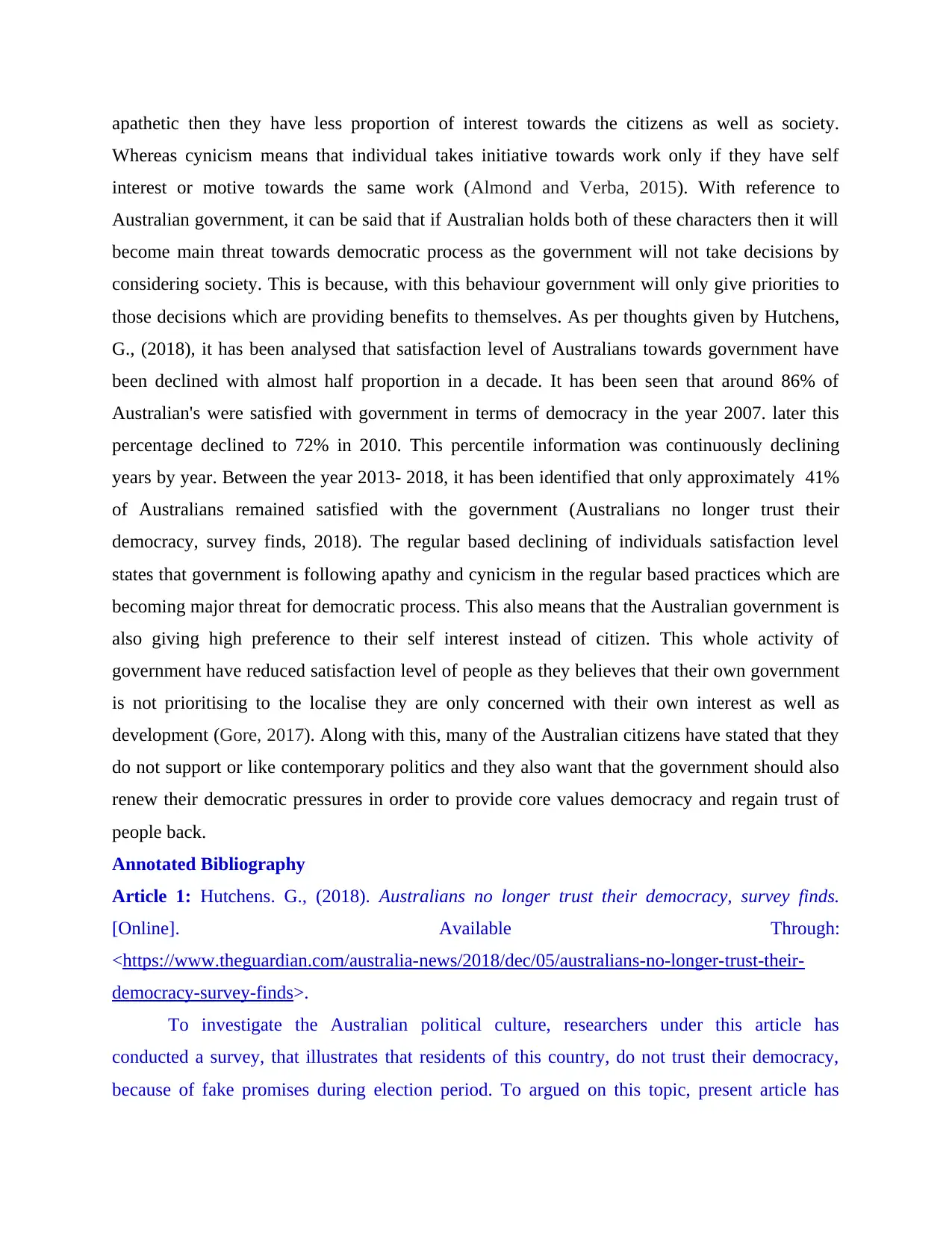
apathetic then they have less proportion of interest towards the citizens as well as society.
Whereas cynicism means that individual takes initiative towards work only if they have self
interest or motive towards the same work (Almond and Verba, 2015). With reference to
Australian government, it can be said that if Australian holds both of these characters then it will
become main threat towards democratic process as the government will not take decisions by
considering society. This is because, with this behaviour government will only give priorities to
those decisions which are providing benefits to themselves. As per thoughts given by Hutchens,
G., (2018), it has been analysed that satisfaction level of Australians towards government have
been declined with almost half proportion in a decade. It has been seen that around 86% of
Australian's were satisfied with government in terms of democracy in the year 2007. later this
percentage declined to 72% in 2010. This percentile information was continuously declining
years by year. Between the year 2013- 2018, it has been identified that only approximately 41%
of Australians remained satisfied with the government (Australians no longer trust their
democracy, survey finds, 2018). The regular based declining of individuals satisfaction level
states that government is following apathy and cynicism in the regular based practices which are
becoming major threat for democratic process. This also means that the Australian government is
also giving high preference to their self interest instead of citizen. This whole activity of
government have reduced satisfaction level of people as they believes that their own government
is not prioritising to the localise they are only concerned with their own interest as well as
development (Gore, 2017). Along with this, many of the Australian citizens have stated that they
do not support or like contemporary politics and they also want that the government should also
renew their democratic pressures in order to provide core values democracy and regain trust of
people back.
Annotated Bibliography
Article 1: Hutchens. G., (2018). Australians no longer trust their democracy, survey finds.
[Online]. Available Through:
<https://www.theguardian.com/australia-news/2018/dec/05/australians-no-longer-trust-their-
democracy-survey-finds>.
To investigate the Australian political culture, researchers under this article has
conducted a survey, that illustrates that residents of this country, do not trust their democracy,
because of fake promises during election period. To argued on this topic, present article has
Whereas cynicism means that individual takes initiative towards work only if they have self
interest or motive towards the same work (Almond and Verba, 2015). With reference to
Australian government, it can be said that if Australian holds both of these characters then it will
become main threat towards democratic process as the government will not take decisions by
considering society. This is because, with this behaviour government will only give priorities to
those decisions which are providing benefits to themselves. As per thoughts given by Hutchens,
G., (2018), it has been analysed that satisfaction level of Australians towards government have
been declined with almost half proportion in a decade. It has been seen that around 86% of
Australian's were satisfied with government in terms of democracy in the year 2007. later this
percentage declined to 72% in 2010. This percentile information was continuously declining
years by year. Between the year 2013- 2018, it has been identified that only approximately 41%
of Australians remained satisfied with the government (Australians no longer trust their
democracy, survey finds, 2018). The regular based declining of individuals satisfaction level
states that government is following apathy and cynicism in the regular based practices which are
becoming major threat for democratic process. This also means that the Australian government is
also giving high preference to their self interest instead of citizen. This whole activity of
government have reduced satisfaction level of people as they believes that their own government
is not prioritising to the localise they are only concerned with their own interest as well as
development (Gore, 2017). Along with this, many of the Australian citizens have stated that they
do not support or like contemporary politics and they also want that the government should also
renew their democratic pressures in order to provide core values democracy and regain trust of
people back.
Annotated Bibliography
Article 1: Hutchens. G., (2018). Australians no longer trust their democracy, survey finds.
[Online]. Available Through:
<https://www.theguardian.com/australia-news/2018/dec/05/australians-no-longer-trust-their-
democracy-survey-finds>.
To investigate the Australian political culture, researchers under this article has
conducted a survey, that illustrates that residents of this country, do not trust their democracy,
because of fake promises during election period. To argued on this topic, present article has
Paraphrase This Document
Need a fresh take? Get an instant paraphrase of this document with our AI Paraphraser
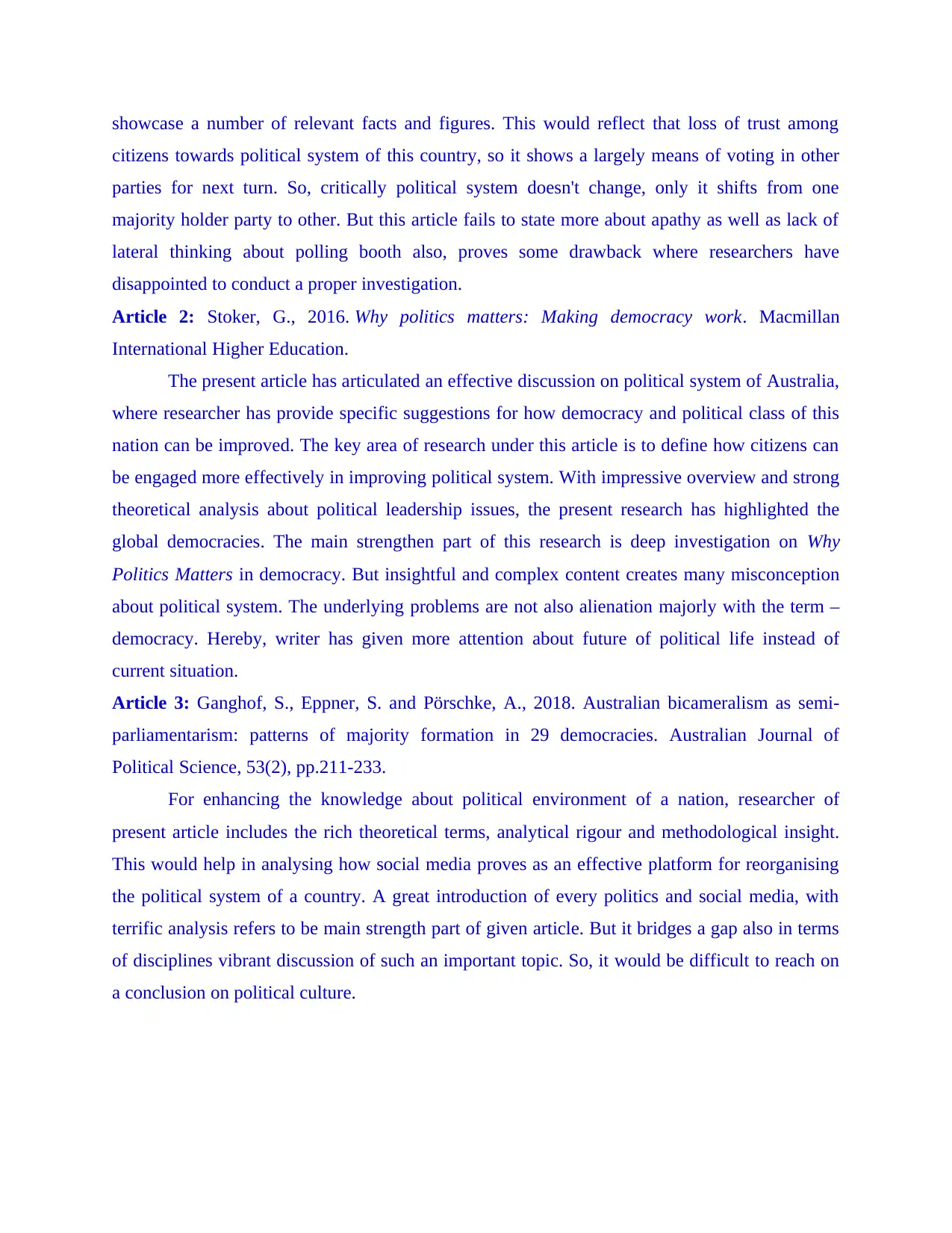
showcase a number of relevant facts and figures. This would reflect that loss of trust among
citizens towards political system of this country, so it shows a largely means of voting in other
parties for next turn. So, critically political system doesn't change, only it shifts from one
majority holder party to other. But this article fails to state more about apathy as well as lack of
lateral thinking about polling booth also, proves some drawback where researchers have
disappointed to conduct a proper investigation.
Article 2: Stoker, G., 2016. Why politics matters: Making democracy work. Macmillan
International Higher Education.
The present article has articulated an effective discussion on political system of Australia,
where researcher has provide specific suggestions for how democracy and political class of this
nation can be improved. The key area of research under this article is to define how citizens can
be engaged more effectively in improving political system. With impressive overview and strong
theoretical analysis about political leadership issues, the present research has highlighted the
global democracies. The main strengthen part of this research is deep investigation on Why
Politics Matters in democracy. But insightful and complex content creates many misconception
about political system. The underlying problems are not also alienation majorly with the term –
democracy. Hereby, writer has given more attention about future of political life instead of
current situation.
Article 3: Ganghof, S., Eppner, S. and Pörschke, A., 2018. Australian bicameralism as semi-
parliamentarism: patterns of majority formation in 29 democracies. Australian Journal of
Political Science, 53(2), pp.211-233.
For enhancing the knowledge about political environment of a nation, researcher of
present article includes the rich theoretical terms, analytical rigour and methodological insight.
This would help in analysing how social media proves as an effective platform for reorganising
the political system of a country. A great introduction of every politics and social media, with
terrific analysis refers to be main strength part of given article. But it bridges a gap also in terms
of disciplines vibrant discussion of such an important topic. So, it would be difficult to reach on
a conclusion on political culture.
citizens towards political system of this country, so it shows a largely means of voting in other
parties for next turn. So, critically political system doesn't change, only it shifts from one
majority holder party to other. But this article fails to state more about apathy as well as lack of
lateral thinking about polling booth also, proves some drawback where researchers have
disappointed to conduct a proper investigation.
Article 2: Stoker, G., 2016. Why politics matters: Making democracy work. Macmillan
International Higher Education.
The present article has articulated an effective discussion on political system of Australia,
where researcher has provide specific suggestions for how democracy and political class of this
nation can be improved. The key area of research under this article is to define how citizens can
be engaged more effectively in improving political system. With impressive overview and strong
theoretical analysis about political leadership issues, the present research has highlighted the
global democracies. The main strengthen part of this research is deep investigation on Why
Politics Matters in democracy. But insightful and complex content creates many misconception
about political system. The underlying problems are not also alienation majorly with the term –
democracy. Hereby, writer has given more attention about future of political life instead of
current situation.
Article 3: Ganghof, S., Eppner, S. and Pörschke, A., 2018. Australian bicameralism as semi-
parliamentarism: patterns of majority formation in 29 democracies. Australian Journal of
Political Science, 53(2), pp.211-233.
For enhancing the knowledge about political environment of a nation, researcher of
present article includes the rich theoretical terms, analytical rigour and methodological insight.
This would help in analysing how social media proves as an effective platform for reorganising
the political system of a country. A great introduction of every politics and social media, with
terrific analysis refers to be main strength part of given article. But it bridges a gap also in terms
of disciplines vibrant discussion of such an important topic. So, it would be difficult to reach on
a conclusion on political culture.
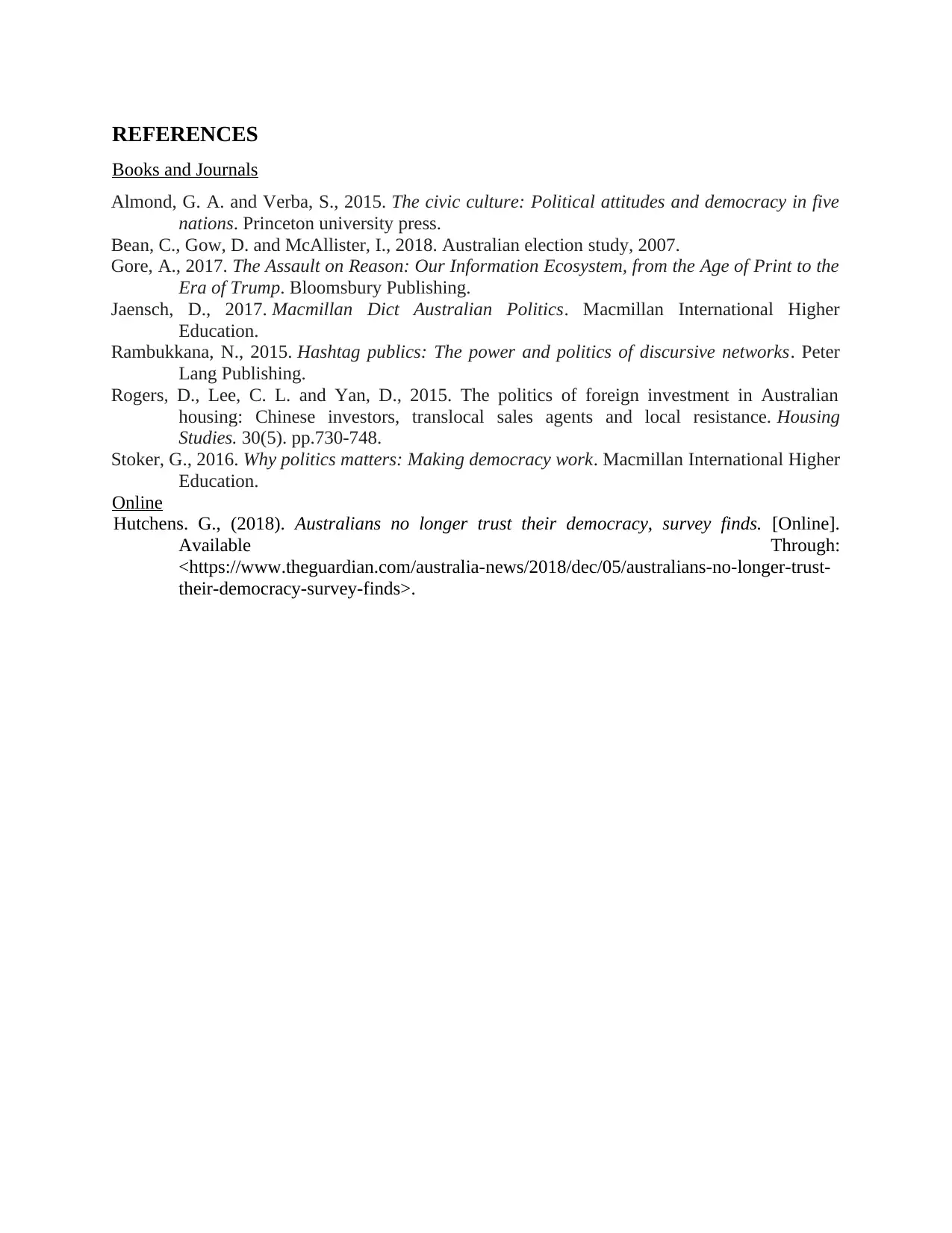
REFERENCES
Books and Journals
Almond, G. A. and Verba, S., 2015. The civic culture: Political attitudes and democracy in five
nations. Princeton university press.
Bean, C., Gow, D. and McAllister, I., 2018. Australian election study, 2007.
Gore, A., 2017. The Assault on Reason: Our Information Ecosystem, from the Age of Print to the
Era of Trump. Bloomsbury Publishing.
Jaensch, D., 2017. Macmillan Dict Australian Politics. Macmillan International Higher
Education.
Rambukkana, N., 2015. Hashtag publics: The power and politics of discursive networks. Peter
Lang Publishing.
Rogers, D., Lee, C. L. and Yan, D., 2015. The politics of foreign investment in Australian
housing: Chinese investors, translocal sales agents and local resistance. Housing
Studies. 30(5). pp.730-748.
Stoker, G., 2016. Why politics matters: Making democracy work. Macmillan International Higher
Education.
Online
Hutchens. G., (2018). Australians no longer trust their democracy, survey finds. [Online].
Available Through:
<https://www.theguardian.com/australia-news/2018/dec/05/australians-no-longer-trust-
their-democracy-survey-finds>.
Books and Journals
Almond, G. A. and Verba, S., 2015. The civic culture: Political attitudes and democracy in five
nations. Princeton university press.
Bean, C., Gow, D. and McAllister, I., 2018. Australian election study, 2007.
Gore, A., 2017. The Assault on Reason: Our Information Ecosystem, from the Age of Print to the
Era of Trump. Bloomsbury Publishing.
Jaensch, D., 2017. Macmillan Dict Australian Politics. Macmillan International Higher
Education.
Rambukkana, N., 2015. Hashtag publics: The power and politics of discursive networks. Peter
Lang Publishing.
Rogers, D., Lee, C. L. and Yan, D., 2015. The politics of foreign investment in Australian
housing: Chinese investors, translocal sales agents and local resistance. Housing
Studies. 30(5). pp.730-748.
Stoker, G., 2016. Why politics matters: Making democracy work. Macmillan International Higher
Education.
Online
Hutchens. G., (2018). Australians no longer trust their democracy, survey finds. [Online].
Available Through:
<https://www.theguardian.com/australia-news/2018/dec/05/australians-no-longer-trust-
their-democracy-survey-finds>.
⊘ This is a preview!⊘
Do you want full access?
Subscribe today to unlock all pages.

Trusted by 1+ million students worldwide
1 out of 6
Your All-in-One AI-Powered Toolkit for Academic Success.
+13062052269
info@desklib.com
Available 24*7 on WhatsApp / Email
![[object Object]](/_next/static/media/star-bottom.7253800d.svg)
Unlock your academic potential
Copyright © 2020–2026 A2Z Services. All Rights Reserved. Developed and managed by ZUCOL.

